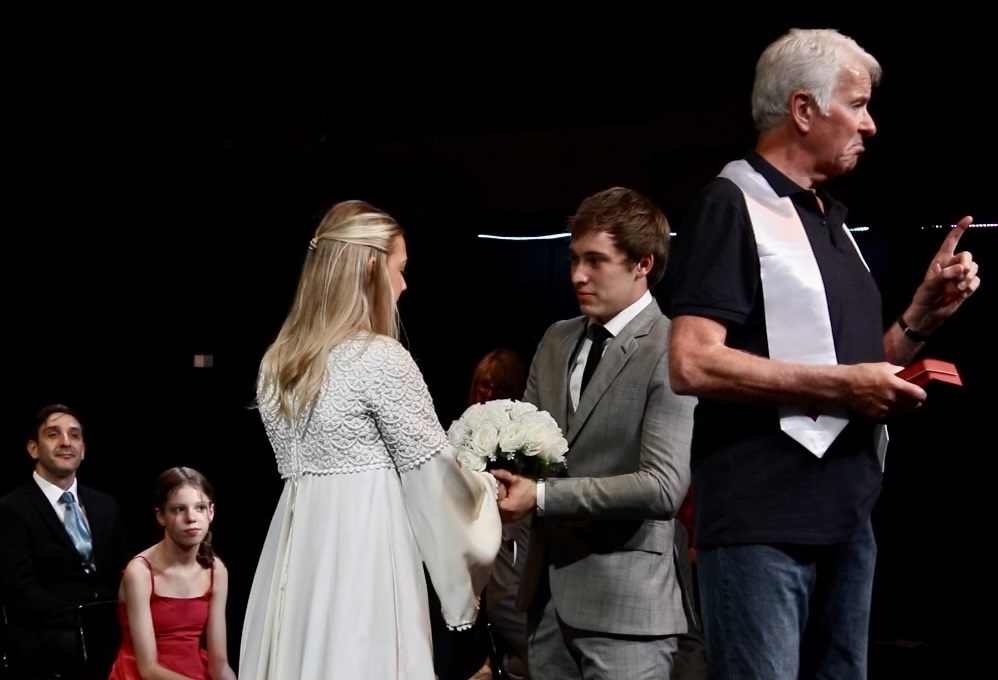
RORY Mulvihill’s avuncular Stage Manager – a narrator, ringmaster, master of ceremonies and Cassandra rolled into one – talks of the stars “doing their old, old crisscross journeys” since four billion years ago.
You could call Thornton Wilder’s Our Town a time play, not in the manner of Bradford playwright J B Priestley’s Time Plays of the 1930s and 1940s, but because of the importance of time and using it well.
As director Bryan Bounds said afterwards: “The third act is the glass of water in the face to say, ‘Wake up, this is all going to be gone before you realise it’.”
Ironically, neither Mulvihill’s measured, mellifluous Stage Manager nor Wilder’s play, with its two intervals rather than the customary one, is in a particular hurry. The watch is ticking well past 10pm as we leave, more than two and a half hours after our arrival, but rest assured, time spent in the company of Wilder and “Yorkshire’s American theatre company” is time spent well indeed, particularly after that remarkable, rug-pulling third act.
Our Town has been called “America’s greatest play”, and while your reviewer does not have the time to debate that contention here, the likes of David Mamet and Edward Albee, no less, speak of this 1938 Pulitzer Prize winner that highly.
Advance publicity had suggested Amerrycan Theatre’s modern-dressed production was a very belated York premiere for Our Town, but it has since come to light that Rowntree Players presented it in the late 1950s, the actor who played young lead George Gibbs now in his 80s.
Nevertheless, that remains a long, long hiatus since its only York production, an act of neglect frankly. Not that you would feel that way after the gentle loosener of the first act, where Mulvihill leads a guided tour of Grover’s Corners, New Hampshire, population, 2,642.
Everyone knows everyone and their business in this little American town with its quietly competitive churches, railway, blanket factory and all-in-one town hall, post office and jail .
Wilder is presenting a microcosm of American life, much like Dylan Thomas’s portrait of the mythical Welsh seaside village of LLareggub in his 1954 radio drama Under Milk Wood, but Thomas’s play spanned only 24 hours, whereas Wilder’s three acts span 12 years from 1906 to 1918, rather than the original 1901 to 1913, in Bounds’s account with intervals of three years from Daily Life (May 7 1906) to Act Two’s Love and Marriage (July 7 1909) and nine more to Act Three’s Death and Eternity (Autumn 1918, originally Summer 1913).
A cast of 14 populates Our Town, some from York, others from Leeds and Harrogate, one born in Tasmania, Bounds originally from Temple, Texas, and his computer engineer friend, Thomas Miller, from southern Illinois, in his first foray into acting since university days. Just as we grow to know Wilder’s characters, an interval read of the programme profiles reveals plenty too, each accompanied by a black-and-white photograph from childhood days.
Our Town is deemed a radical play, not only in breaking down theatre’s fourth wall for Mulvihill to ask various (primed) audience members questions about Grover’s Corners, and in its lack of props and rudimentary scenery, but also in its bravura use of dead people – yes, you can see dead people a la The Sixth Sense – who rise from their graves to take seats to conduct Act Three from beyond.
Here, these dead souls of the cemetery discuss life’s transience, as Craig Kirby’s suicidal drunkard, the now late choirmaster Simon Stimson, scalds the living for their ignorance and bliss in Wilder’s bleaker, blacker version of Jaques’ monologue in Shakespeare’s As You Like It. Bleaker still, they castigate the grieving George (spoiler alert) for wasting his time in visiting the graveyard.
Everything is milk and roses on the surface in Act One, even in the Sentinel newspaper run by the upright Mr Charles Webb (Andrew Isherwood), but gradually more than small-town gossip prevails. The women are not happy to be subservient; young Wally Webb (Harrison Turner-Hazel, a name for an actor if ever there were one!) must go off to war; symbolically, Kirby’s erratic Stimson tells the ladies of the Congregational Church choir (Jess Murray’s outstanding Mrs Myrtle Webb among them) that they sing too loudly.
At the play’s core is a love story, one of young lovers, neighbours George Gibbs (Frankie Bounds), the sports jock, and Emily Webb (Emily Belcher), the brightest pupil at school. The Romeo and Juliet of Wilder’s world, their courtship scenes are a delight, but the marriage ceremony shocks: a forewarning of Act Three’s darkness to come. Bounds junior and Belcher are terrific in those scenes, and Belcher is better still in the play’s stark climax.
America’s greatest play? You decide, but your first decision should be to visit Our Town and its story of everyday life and the extraordinary in the ordinary, but hurry, it will soon be leaving town.
Amerrycan Theatre in Our Town, Theatre@41, Monkgate, York, 7.30pm tonight and tomorrow; 2.30pm and 7.30pm, Saturday. Box office: tickets.41monkgate.co.uk.
